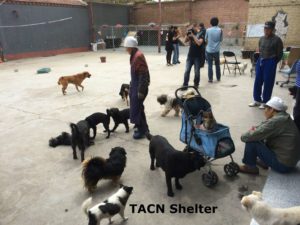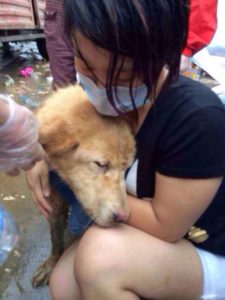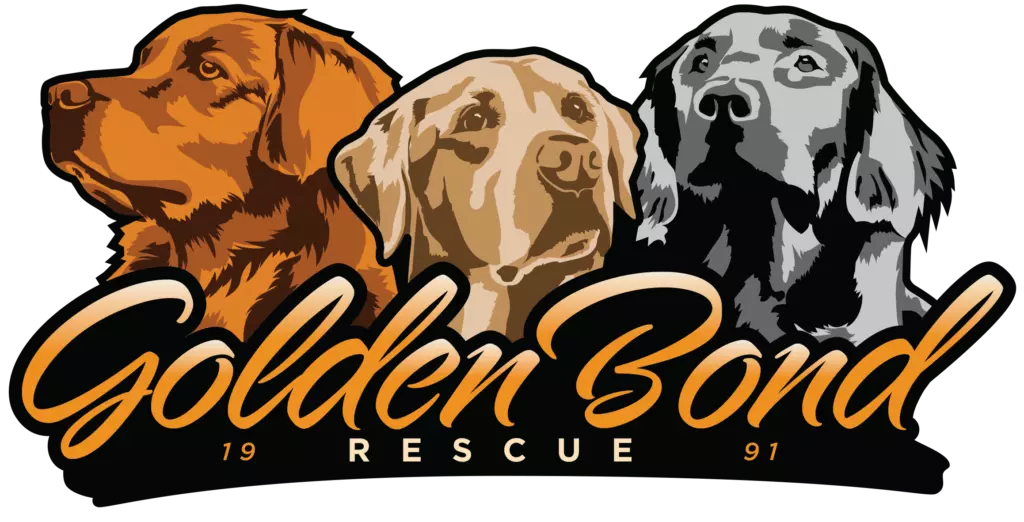China’s Dog Meat Trade Survivors Need Your Help

Below is a short video of the dogs while they were in Qi’s shelter. Some of them have now been moved into a foster home.
We need your help to raise $2,000 per dog ($10,000 total) to get them out of China and to Oregon. To see individual pictures of each dog, donating options, and our fundraiser goal thermometer (also found on the Home page), click here…
How Come So Much $$$ Per Dog?
GBR and TACN contacted several passenger airline companies as well as air cargo companies to find the most safe and economical way to get the dogs to SeaTac Airport. What we discovered was that if GBR/TACN used an air cargo company, the Chinese government would require us to treat the dogs as if we were exporting goods from China. We would have to use a government agent to: 1) handle the dogs; 2) purchase special export documents; and 3) complete the forms, all this increased the per dog cost about $1,300 to $2,300. For example, United Air Cargo gave us a quote of $4,300 per dog to fly them to SeaTac and $3,300 per dog to fly them to San Francisco.

With the cost of the dogs’ medical care in Beijing, their airfare, export documents (these are legal requirements), and medical certificates the cost per dog will average $2,000. The costs will vary based on the weight of each dog plus the medical care each dog will need in order to get healthy enough to enter the US.
Why Doesn’t TACN Adopt the Dogs out Locally?

As mentioned earlier, many Chinese are afraid of dogs. In Beijing, as well as many other big cities in China, it is against the law to own a dog that is any larger than about 14” (35 cm) tall. In fact all dogs must have a license and owners are unable to get a license for a large dog, like a golden. You might ask, “Where are the goldens coming from?” Although the law doesn’t allow large dogs in central areas of Beijing, they are allowed in the rural outskirts of the city. Goldens are very popular in China, as are Samoyeds. The golden puppy mills are alive and well in the towns outside the city limits. For more information about the crack down on large and unlicensed dogs in Beijing and other cities in China, please read the article published online at World Grassroots Alliance for Paws in China (WGAP).
So here is what would likely happen if you ignored the law and got a golden puppy: You’d be fine until that puppy grew past 14” (35 cm) tall. To avoid the police, you’d begin walking your dog in the very early hours of the morning or very late hours of the night. If your neighbor turned you in or you’re spotted and stopped by the police, your golden would be confiscated and taken to the government’s “pound.” You would probably not get your dog back from the pound. Your golden would either be euthanized or, in some cases, sold to the dog meat trade.

What About The Shelters?
The main shelter supported by TACN is rare in China – they limit the number of dogs they take in. They do this because their top concern is the animals’ welfare and like all shelters in China, they have very limited funds, a small area in which the dogs can live and play, plus they know crowded dogs encourage disease. The main shelter supported by TACN currently only has just over 40 dogs, as well as cats, some rescued from the cat meat market.
Shelters in China are commonly owned by compassionate individuals with kind hearts who take in as many dogs as they can. These individuals are usually people who help during the dog meat trade raids and help take care of some of the dogs rescued. The trouble is most of the “shelters” have no regular funding and can barely pay to keep the dogs fed. Many “shelters” don’t or cannot afford to have their dogs neutered/spayed, or have the dogs vaccinated, or get medical help. Basically, the dogs could potentially jump from the dog meat trade frying pan into the fire. Many of the dogs die in the shelters because of lack of care or from diseases caused by overcrowding.
The core objectives of TACN is to educate, support and collaborate with the individual shelters, as well as help them develop positively and sustainably. Distrust of Westerners could easily develop in China, e.g GBR wanting to bring specific breed dogs over to the States. Somehow, some rescuers have become convinced that Westerners want the dogs for medical research. Some people would also fear, in some cases rightly so, that dog meat traders are posing as rescuers only to put the rescued dogs back on the market. It is not unusual for these “Posers” to go to shelters asking for large numbers of dogs only to take the dogs directly to a slaughterhouse. Lastly, the idea of a rescue dedicated to only one breed is completely foreign to the Chinese rescuers, this could be the reason why there is distrust, doubts and fear.
Project Team Members from TACN are confident that with the successful transport of Ryan, Amy, Abby (all three already here), plus Billie, Blake, Betty, Brad, and Beanie to the U.S. (hopefully in April or May), more and more China shelters would be willing to release their goldens to GBR. Trusted sources suggest that there are approximately over 100 dog meat survivor goldens languishing in shelters in Beijing.
How Can GBR Afford to Bring Over 100-ish Goldens?
GBR’s Board is aware that we don’t have the funds or the foster homes to handle 100 China goldens as well as the Taiwan and local goldens. That’s why we are reaching out to 95 golden retriever rescues that are scattered across the U.S. Our hope is that other golden retriever rescues will want to take in many of the China goldens. Having said this, GBR is committed to bringing over as many dog meat golden survivors as possible.
What Is The Dog Meat Trade In China?
GBR feels it’s important for our supports to know all the information, as ugly and as heart wrenching as it is, so you can make an informative decision. This next part is not pretty and may cause some of you to lose sleep but you need to know.
You need to understand what these dogs have gone through. Read more…


